- Home
- Doug Walker
The Good Deed Page 3
The Good Deed Read online
Page 3
I chose the river, boarding a vessel that same day, a vessel teeming with humanity and animal life. Jolly companions, but so closely crammed aboard that there was hardly room to think.
Two days later, I hopped off at a nameless village and haggled with the chief for an abandoned hut. There I swung in peace on a hammock with mosquito netting guarding against bloodsuckers and the threat of malaria.
A few paperback novels were my companions and I befriended a couple of brothers who were working to repair their dilapidated truck. I couldn’t offer them any advice, but said I might be good for a few francs if they could advance me on my quest to Timbuktu. They welcomed any currency that might come their way.
CHAPTER ELEVEN
There I was in the West African bush with a hammock, a few books, food purchased from nearby huts, two men piddling with a forlorn truck, peace and contentment. Life went on as it had for hundreds of years, except for the introduction of the truck. The unexpected, the life-changing event, arrived when least expected.
It came in the form of an earthshaking roar like an enraged god of the bush, a clipping of treetops and a sickening crash. An airplane was down and not far away.
I was chatting with the brothers at the time, the truck sitting there like a silent animal. “Will that thing run?” I questioned.
Both brothers were fascinated by the crash and I had trouble getting their attention, but one finally answered in the affirmative. “Get in, let’s go. I’ll pay you later.” That was all the encouragement needed. The three of us bounced through the bush to the crash site.
The plane was a smoking mess when we arrived. The fuselage had ruptured on impact and a man’s body was sprawled on the ground. Dead or alive? If alive, he was unconscious. A flame flickered near one of the smashed engines, a warning of what would come next. We stood at first transfixed. Then I shouted to the two. “Let’s get that man clear of the wreck. ”
Running for his body, the two natives were close behind. We half dragged and half carried him to where the truck had stopped just as the plane burst into flame and a fuel tank exploded. We were still too close. Quickly, we hoisted him into the back of the truck and moved back out of range of the holocaust. The plane and everything in it was soon consumed by fire, leaving only skeletal remains.
With that gone, we turned our attention to the man in the truck, a stout man beyond middle age. His left leg was at an odd angle and appeared to be broken.
“Is there a doctor nearby?” I questioned.
“A clinic,” the older brother, the one whose name sounded like Tu, replied.
“Can we drive there?” He nodded in the affirmative, and we boarded the truck and moved through the bush, this time in a more careful manner, avoiding downed limbs and other hazards. We hit a dusty trail and soon pulled up before a clinic, a sign with a red cross by the door indicating its purpose. It looked deserted. I asked if there was an attendant.
“A nurse,” Tu said. “Comes once a week, I think tomorrow.”
“Is it locked?”
Tu laughed. “Nothing inside. Nothing to steal. Never locked.”
Finally, I noticed that there was no door. Going inside, there were a couple of rough cots, what might pass for an operating table, several shelves and cabinets and a pair of woebegone chairs. I remarked to Tu that there were no medical supplies.
“She brings everything. Nice truck, everything in the truck.”
“Well, let’s get this man inside. I believe he’s alive, I saw some movement.”
Carrying him in, we arranged him as comfortably as possible on one of the cots. Loosening his belt, I pulled off his trousers and removed his wallet. There was a passport in his shirt pocket as well as credit cards, driver’s license, other cards, and a few Euros. His name was Woodrow Wilson Harris. That somehow rang a bell, but I could not place it. His left leg seemed to be broken, and we could only wait for the nurse to arrive, perhaps tomorrow.
The small settlement was fairly compact, and the clinic was part of it. I asked Tu and his brother Toguna to go to my shack and bring back food, blankets, beer and candles. My intention was to remain in the clinic until the nurse arrived.
Later the three of us shared food and beer, and as it grew dark we lit a candle. Harris remained unconscious.
Tu spoke of the brother’s delight when they got the truck from a family member and how one thing after another had gone wrong. It was running fairly well now, but the tires were bare.
“This man,” I nodded toward the clinic as we sat on the ground outside, “will likely pay you well to take him wherever he wants to go. You can probably charge him enough to get a set of tires.”
The two brightened and said they would also need gasoline money.
I told them that shouldn’t be a problem, but asked if there was enough work nearby to keep a truck employed.
“Our dream is to go to the city,” Toguna said. “We are poor people, our families have been tied to the land forever.”
“But the land, the life of a farmer can be heaven, or paradise, whatever your belief, and you can have a good wife, a growing family, an extended family. The city has advantages, but there are pitfalls. The simple life is a good life.”
“Things worsen each year,” Tu said. “There is no rain, there is too much rain, our small crops fail, the chickens are stolen, and the women run off to the city. What can we do?”
I responded. “In my country we had a very smart man who many years ago spent months and months living in a kind of wilderness near a pool of water, watching the seasons change, studying the plants and wildlife. His message was simplify, simplify, simplify.”
Tu laughed. “We are simple people and that’s a fact.”
“Sometimes to look at things from a different angle, a different view, that makes all the difference. Have you ever read poetry?”
“Yes,” Toguna responded. “When we were young we attended mission school. An Englishman and his wife were here, not far away. No more mission.
“But she liked poetry very much and would read to us. There was a poet called Bobby Burns she favored.”
“Yes, Burns.” I couldn’t believe I was in the Mali bush discussing Robert Burns with a pair of natives. “There is a poet in the States, his name is Billy Collins, and he wrote a poem about taking a poem and holding it up to the light or walking inside the poem’s room and feeling for the light switch on the wall. He ends the poem by saying:
But all they want to do
is tie the poem to a chair with rope
and torture a confession out of it.
They begin beating it with a hose
to find out what it really means.”
Tu nodded and looked at Toguna, puzzled. We were on the last beer and a moan came from inside the clinic. We took the candle and went inside. Harris was stirring on the cot. His eyes were open.
“Where am I? What happened?”
“The plane crashed. You were thrown clear. The others are dead, burned, incinerated.”
“Holy shit. My leg is killing me.”
“Yes, it seems to be broken,” I explained.
“Where’s the doctor?”
“You’re in the bush in West Africa. We expect a nurse to show up tomorrow. Until then, we’re stuck.”
Harris moaned and moved his arms toward his leg. “Holy shit, please call an ambulance. I can pay.”
“Deep bush.” Then I remembered my scant medical supplies. “But I do have some aspirins. “I’ll get them and some clean water. Tu and Toguna will stay with you. We have netting.”
“Tu and Toguna, Where the hell am I?”
“The country is Mali, not too far from the Niger River. Somewhere between Senegal and Timbuktu.”
“Timbuktu,” Harris repeated. “Am I in hell?” He moaned again, a sound that would be repeated through the night and morning. Nodding to Tu to pull up a chair, I went off through the night, hoping to find my shack and return with the aspirin.
The night turned out to
be long. I slept now and then on the second cot. Tu and Toguna left me alone with Harris, but promised to return in the morning. The two of us would talk occasionally through the night. There had been five other men on the plane, two pilots and two he called “security” and his lawyer. He didn’t know the pilots’ names, but I jotted down the three he did know in case authorities showed up. Others must have heard the plane go down.
His name, Woodrow Wilson Harris, was familiar to me. I searched my brain for a clue, but came up empty.
CHAPTER TWELVE
The time was almost noon when the nurse arrived in her truck. I had had a bad night and a bad morning, but for Woody it had been much worse. He had said, “Call me Woody.” I had the idea he was hiding something, but I didn’t know what. He was an unlikely drug dealer. The plane, he said, was bound from South Africa to London. He hadn’t a clue about what went wrong. He was sleeping in a rear compartment and the next thing he knew he woke up in this hut.
His leg was swollen and painful, his body battered and bruised, a few cuts here and there. He was damned lucky to be alive.
The first thing he said to the nurse was, “Get me out of here. I can pay.”
She looked at him with dark eyes and said, “You’re not the only sick person in Africa.” She had a Latino look. Later I learned she was Cuban.
“I may not be the only sick person, but I’m the richest. I’ll buy your truck. I’ll buy you a house, anything. Just get me to a hospital.”
“This is a hospital,” she told him. “Now I’ll have a look at your leg.” Of course it was broken. She gave him a shot of morphine, which calmed him down considerably. Then she applied a makeshift splint. She told me it was too swollen for a cast.
The morphine did its work and Woody slept. “He’ll need to rest for a few days. He’s banged up pretty good. I’ve done what I can. Cleaned his wounds and bandaged him. Maybe in three or four days Tu could drive him to Mopti. There’s a good hospital there.”
I told her I had aspirin, and she said that was about the best we could do. She looked around for other patients, but there were none. She had a couple of house calls to make in the area, a very sick child and a pregnant woman. Then she was gone.
Woody’s statement about being the richest patient had tripped my memory. Woodrow Wilson Harris was among the top ten richest people in America. Of course it was his jet. He was into vast real estate holdings, owned major portions of several companies and not long ago had gone into publishing.
A biographical article had appeared in a magazine not long ago. Which one, I forget – Atlantic, Harper’s or maybe Time or Fortune. He was not only rich, but he was a rich bigot. He disliked blacks and Jews and contributed heavily to various hate organizations including the Ku Klux Klan, neo Nazis, skinheads, right-wing militias and others of the same stripe.
Imagine him falling to earth in the heart of Africa, the heart of darkness. No wonder he had simply said, “Call me Woody” and brushed off questions about his business. He was in fact your quintessential extreme right-winger.
Woody awoke toward evening and asked for the nurse. I told him she had been gone for hours.
“Is she coming back for me?”
“No. She did what she could. You should rest for three or four days, then the boys might drive you into a city, probably Mopti, if their truck is running OK.”
“Never heard of it. What about their truck? Is something wrong with it?”
I chuckled at that. “Everything seems to be wrong with it. Tires, engine, radiator, belts.”
“I can pay them. I have money, a great deal of money. I’ll pay you too. Get you out of here.”
“I came here on my own. I’m on vacation. It’s very restful. I do some reading. There’s a sort of a native store not far away. It’s really just a hut like this. He sells beer and rice and a few other things like toilet paper. Of course you’re injured, but the nurse said you could simply rest. Nothing seriously wrong with you, except that broken leg. That will mend.”
“Holy Christ, you like it here,” he said almost to himself. “Where’s my stuff? My pants, my wallet?”
“I’ve got them. I’ll keep them for you until you’re ready to go.”
“Maybe I should keep it. What about my other stuff?”
“You’re in no condition to keep anything. And there was no other stuff. The plane burned to a cinder.”
“My lawyer. He was starting to make my will. Imagine a man of my age, a man of property with no will. I’ve got organizations I wanted to leave money to. They do good work. If I die now all my money goes directly to my wife. What does she know about the world?”
“A good woman can do good deeds with wealth.”
“Good deeds. I suppose some lefty commie sympathizers might get a hold of her. Feed the poor, heal the poor. Welfare recipients, a lifestyle. God, guns and guts! Why in the hell can’t the poor work like everybody else? Anyway, I will have a will. This little episode has been a lesson to me. You tell those truck boys that I’ll see to it that they have a good vehicle. If they will just get me out of here, the sooner the better.”
CHAPTER THIRTEEN
That evening I huddled with Tu and Toguna at my hut before taking Woody his evening meal and a bottle of beer. Part of the situation I laid out, but not everything. I asked if they knew of a deserted hut up near the volcano. I knew that small peak whose local name was Alpha Konare was generally marked by a smoke plume and sometimes grumbled with excitement.
“Most people up there have abandoned their huts,” Tu said. “They fear Alpha Konare.”
Asked where the name came from, Tu said it was named after a former Mali president. Rather than asking Tu to explain, I decided to tell them about Woodrow Wilson Harris, that he was a racist, not just a racist, but a great white father of racists.
“He will promise to fix your truck, maybe even buy you a knew truck, but can he be trusted? I think not.” The germ of a plan, an unhatched egg, was in my head and I told them what we could do, and they agreed.
We took the truck to the clinic and I informed Woody that we must move him to an unused hut where he would be more comfortable.
The news appeared to agitate him. “Why can’t I stay here? The nurse will be back sooner or later.”
“Others will come to this clinic for medical treatment. There might be a whole family. Perhaps some of them diseased. There are strange maladies in the bush, some of them untouched by modern medicine, deformed bodies, twisted minds.”
Woody cringed and reluctantly agreed. As carefully as possible, handling his broken limb gingerly, we loaded him in the truck and set off for Alpha Konare. Riding in the truck bed with him, he remarked that the truck seemed to be doing OK. “Why not just go to a nearby city now?”
“The trail is rough and the truck uncertain. We could be stranded in the bush, far from food and water.”
He was silent, pensive, for the rest of the trip.
Tu knew just the hut he was seeking, one closest to the rim of the new volcano. It had been the residence of a fairly prosperous farm by Mali standards. The farmer and his family had fled after a few burps and flurries of hot ash from Alpha Konare. Household goods were gone, but they had left the rough cots. I personally preferred a hammock that I had in my small hut, far from the volcano.
After loading Woody onto a cot and bringing what supplies we had into the hut, Woody said he smelled something burning.
Tu laughed. “That’s old Alpha Konare.”
“What’s that?” Woody questioned, his voice grim with alarm.
“A nearby volcano. Not to worry. It rumbles now and then, but doesn’t act up too badly. ”
With his broken leg useless and not really set, Woody was as helpless as a newborn. He had a few choice words for the new location, but eventually calmed down enough to eat his rice and yams and drink his one bottle of beer.
“During the night there might be a few flashes of light from the volcano, but during the day they are not visible, ju
st smoke, steam, or whatever,” I told him. “Early tomorrow, I’ll return.”
Woody thrashed in bed, then winced with pain as he turned his leg. He moaned then shouted, “You’re going to leave me here alone near the crater of a live volcano? You’re sacrificing my body to some pagan god?”
“There’s nothing to fear. This low level of activity has been going on for some time. The beauty part is the natives stay away and there is fruit to pick, bananas, pineapple, mangos, a virtual untouched Garden of Eden, paradise.”
“Paradise, my ass,” Woody grumbled.
“Tomorrow I will bring you more beer and maybe some native hooch if I can lay my hands on it.” With that we left him with his own thoughts, isolated near a volcano in the heart of West Africa.
CHAPTER FOURTEEN
Instructing Tu and his brother to stay away, I made my way on foot up to the isolated hut the following morning, greeted Woody who was awake and attempting to read a paperback mystery.
“What did you bring?” Woody questioned.
Placing the items on the board table, I named them one by one. “Some boiled rice, a roasted yam, a pineapple I picked along the trail, a quantity of water and a jar of native alcohol. They call it cane juice.”
“Is it strong?”
“I think so. I’ve never tried it.” I shrugged. “It’s distilled. They probably have little control over its potency. Taste will tell.”
“And how big a hangover? Did you talk to the boys? Will they come and get me?”
“Yes and no.”
“That’s not an answer. Did you tell them I’d pay? I can’t stand being cooped up here.”
“Happiness comes from within.”
“Bullshit. Are they coming or not?”
“They don’t trust you.”
“Trust!” He was instantly angry. “What’s trust got to do with it? I’ve got the money. I’ll pay a king’s ransom, a year’s salary. Just get me to a hospital, no more witchcraft.”

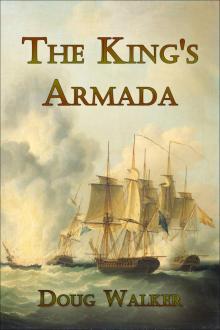 The King's Armada
The King's Armada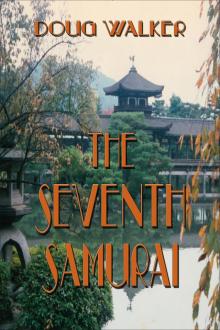 The Seventh Samurai
The Seventh Samurai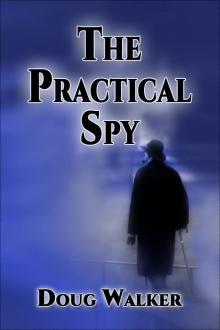 The Practical Spy
The Practical Spy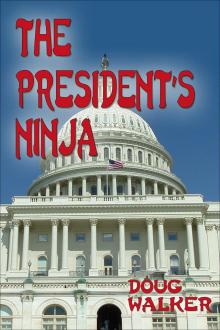 The President's Ninja
The President's Ninja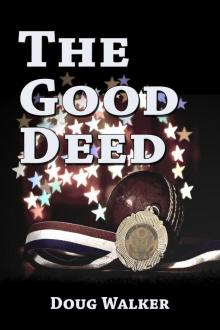 The Good Deed
The Good Deed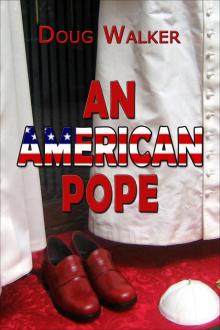 An American Pope
An American Pope